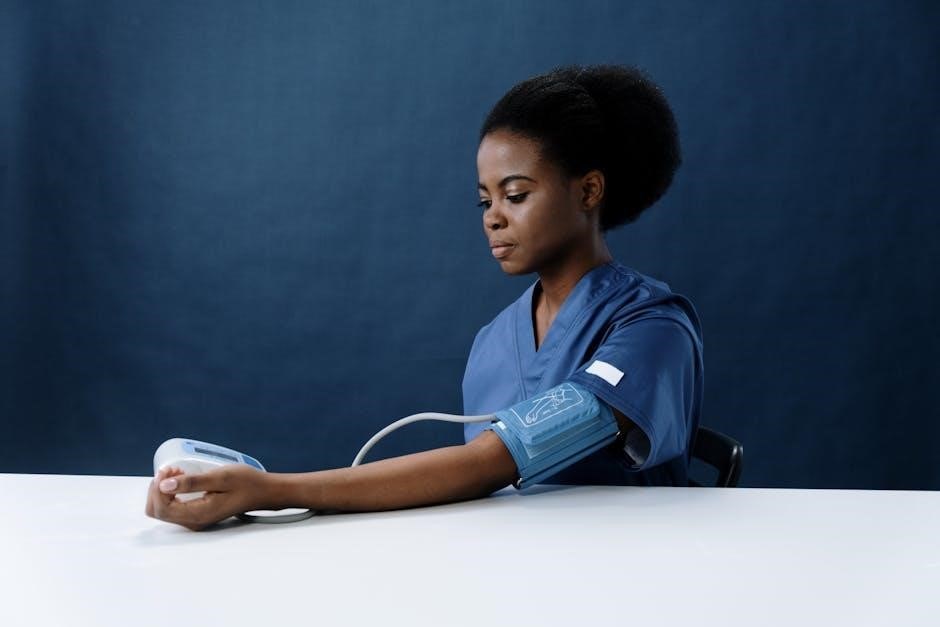Fundamentals of Nursing provides foundational knowledge and skills essential for first-year nursing students. It covers basic patient care, vital signs, and the nursing process, ensuring a solid start in the profession.
Overview of Nursing Education
Nursing education combines theoretical knowledge and clinical training, preparing students for diverse healthcare roles. Programs vary, with options like 1-year specialized courses or 2-year community college degrees. The first year focuses on fundamentals, including patient care, vital signs, and the nursing process. Students gain hands-on experience through internships and simulations, ensuring they develop essential skills. Modern programs also integrate digital tools, such as online platforms for accessing resources and tracking progress, enhancing learning efficiency and adaptability in the evolving healthcare landscape.
Importance of First-Year Nursing Fundamentals
The first year of nursing education lays the groundwork for essential skills and knowledge. It introduces students to patient care, vital signs, and the nursing process, ensuring a smooth transition from theory to practice. This foundational year emphasizes safety, professionalism, and ethical practices, preparing students for real-world challenges. Mastering these basics is crucial for building confidence and competence, enabling nurses to provide high-quality care and make sound clinical decisions.

Roles and Responsibilities of a Nurse
Nurses provide holistic patient care, administer medications, monitor health, and educate patients. They also collaborate with healthcare teams, ensuring safe and effective care delivery in various settings.
Historical Context of Nursing
Nursing’s historical context traces back to ancient times, with care provided by religious and charitable groups. Florence Nightingale revolutionized nursing during the Crimean War, establishing it as a formal profession. The New England Hospital for Women pioneered training programs, while studies on nursing functions and activities laid the groundwork for modern practices. Early education models included hospital internships and school-based learning, shaping the foundation of nursing education. These historical milestones have influenced the development of nursing as a vital healthcare profession.
Modern Roles and Responsibilities
Modern nursing involves diverse roles, including patient advocacy, health education, and technology integration. Nurses now use telehealth tools and digital platforms to deliver care. They prioritize patient-centered approaches, focusing on holistic health and preventive strategies. Critical thinking and evidence-based practices are emphasized, ensuring high-quality, safe care. Nurses also collaborate with interdisciplinary teams, addressing complex healthcare challenges. Their responsibilities extend beyond traditional care, encompassing leadership, education, and continuous professional development to meet evolving healthcare needs.

Clinical Skills for First-Year Nursing Students
Clinical skills for first-year nursing students include patient assessment, vital sign monitoring, and infection control. These foundational competencies ensure safe and effective care delivery in healthcare settings.
Basic Nursing Care Procedures
Basic nursing care procedures are essential for first-year students, covering fundamental skills like vital signs monitoring, range-of-motion exercises, and infection control. These procedures ensure patient safety and comfort, forming the cornerstone of nursing practice. Proper technique in these areas is critical for effective care delivery and patient outcomes. Understanding these basics prepares students for more complex tasks in their nursing journey.
Infection Control and Safety Measures
Infection control is crucial in nursing to prevent the spread of pathogens. First-year students learn hand hygiene, use of PPE, and sterilization techniques. Safety measures include proper handling of sharps and biohazardous waste. Understanding these practices ensures a safe environment for patients and healthcare workers, reducing the risk of hospital-acquired infections. Adherence to protocols is emphasized to maintain high standards of care and protect vulnerable populations.

Patient Assessment and Observation
Patient assessment and observation are critical skills for first-year nursing students, involving physical examinations, vital sign monitoring, and documenting findings to guide care planning and the nursing process.
Vital Signs Monitoring
Vital signs monitoring is a critical skill for first-year nursing students, involving the assessment of temperature, pulse, respiration, blood pressure, and oxygen saturation. These measurements provide essential data on a patient’s health status, guiding care decisions. Accurate monitoring helps detect early signs of deterioration, ensuring timely interventions. Proper techniques and documentation are emphasized to maintain patient safety and continuity of care in clinical settings.
Patient History and Physical Examination
Patient history and physical examination are critical skills for first-year nursing students. They involve gathering comprehensive medical, surgical, and social histories to identify health patterns and risks. Physical exams include assessing vital signs, observing overall appearance, and evaluating specific body systems. These assessments guide care planning and early detection of potential issues. For example, range-of-motion exercises help evaluate motor skills, ensuring holistic patient care and informed decision-making. Accurate documentation of findings is essential for continuity of care and legal purposes.

Communication in Nursing Practice
Effective communication is vital in nursing, fostering trust and understanding between nurses, patients, and families. Active listening, empathy, and clear articulation ensure accurate information exchange and compassionate care delivery.
Effective Communication with Patients
Effective communication is crucial in nursing, fostering trust and understanding between nurses and patients. Active listening, empathy, and clear, simple language are key. Non-verbal cues like eye contact and body language also play a significant role. Nurses should adapt communication to meet individual needs, ensuring patients feel heard and respected. This patient-centered approach enhances care quality and builds strong therapeutic relationships, essential for first-year nursing students to master.
Interprofessional Communication
Effective interprofessional communication is crucial in healthcare settings. Nurses must collaborate with doctors, therapists, and other professionals to ensure comprehensive patient care. Clear, respectful dialogue and active listening are essential. Using standardized tools like SBAR (Situation, Background, Assessment, Recommendation) enhances clarity. Open communication fosters trust and teamwork, reducing errors and improving patient outcomes. First-year nursing students learn these skills to integrate seamlessly into healthcare teams, promoting a culture of safety and efficiency in patient care delivery.

Legal and Ethical Considerations
Nursing involves adhering to laws, regulations, and ethical principles. Key concepts include patient confidentiality, informed consent, and professional conduct, ensuring respectful and lawful care delivery.
Nursing Laws and Regulations
Nursing laws and regulations ensure patient safety and ethical practice. They govern licensure, scope of practice, and confidentiality. Compliance with these laws is crucial for legal and professional integrity, protecting both nurses and patients. Violations can lead to penalties, emphasizing the importance of understanding and adhering to these frameworks in daily practice.
Ethical Principles in Nursing
Ethical principles in nursing, such as autonomy, beneficence, non-maleficence, and justice, guide nurses in making decisions that respect patients’ rights and promote well-being. These principles are foundational in the first-year curriculum, emphasizing the importance of confidentiality, honesty, and dignity in care. They ensure nurses provide compassionate, fair, and safe care, upholding trust and professionalism in all interactions. Understanding these principles is crucial for building a strong ethical foundation in nursing practice.

Patient Safety and Quality Care
Patient safety and quality care are prioritized through infection control, safety protocols, and continuous improvement strategies, ensuring reliable and effective care in nursing practice.
Safety Protocols in Nursing Practice
Safety protocols in nursing are critical to preventing errors and ensuring patient well-being. These include proper hand hygiene, use of personal protective equipment (PPE), and safe medication administration. Infection control measures, such as sterilization and isolation procedures, are also essential. Adhering to these protocols reduces risks of hospital-acquired infections and medical errors. First-year nursing students learn these practices to establish a strong foundation in patient safety and quality care.
Quality Improvement in Healthcare
Quality improvement in healthcare focuses on enhancing patient outcomes, safety, and satisfaction through systematic approaches. It involves monitoring patient care processes, identifying gaps, and implementing evidence-based practices. Nurses play a crucial role by adhering to safety protocols, documenting accurately, and participating in continuous improvement initiatives. Regular audits, feedback mechanisms, and staff training are key strategies to ensure high-quality care. This process fosters a culture of excellence, accountability, and patient-centered services.

Documentation in Nursing
Accurate documentation is crucial in nursing, ensuring continuity of care and legal accountability. It involves recording patient histories, treatments, and outcomes, transitioning from manual to electronic health records.
Importance of Accurate Documentation
Accurate documentation is crucial in nursing as it ensures patient safety, legal compliance, and clear communication among healthcare providers. It prevents errors, supports continuity of care, and serves as a legal record. Inaccurate or incomplete documentation can lead to misunderstandings, legal issues, and compromised patient outcomes. Nurses must prioritize precision and detail in recording patient histories, treatments, and progress. This practice also aids in interprofessional collaboration and reimbursement processes, making it a cornerstone of professional nursing care.
Electronic Health Records (EHRs)
Electronic Health Records (EHRs) are digital versions of patient health information, enhancing accessibility and efficiency in healthcare. They store medical histories, diagnoses, medications, and treatment plans securely. EHRs improve communication among healthcare providers, reduce errors, and streamline documentation. Nurses use EHRs to update patient records, track progress, and ensure continuity of care. Training in EHR systems is essential for nursing students, as they become integral tools in modern healthcare settings, promoting patient safety and data accuracy.

Health Promotion and Education
Health promotion and education empower patients to adopt healthy lifestyles and preventive care strategies. Nurses play a key role in educating patients about disease prevention and wellness.
Health Education for Patients
Health education empowers patients to manage their health effectively. Nurses provide personalized information on disease prevention, nutrition, and medication management. Using visual aids and demonstrations, they ensure understanding. Clear communication and cultural sensitivity are key. This education fosters independence, improving health outcomes and quality of life. It is a vital component of nursing care, addressing individual needs and promoting wellness.
Preventive Care Strategies
Preventive care strategies are essential in nursing practice, focusing on health promotion and disease prevention. These include vaccinations, health screenings, and educational programs. Nurses play a key role in educating patients about healthy lifestyles, early detection of diseases, and risk reduction. Regular check-ups and preventive measures help improve patient outcomes and reduce healthcare costs. These strategies are integral to the fundamentals of nursing, emphasizing proactive care to enhance overall well-being and quality of life for individuals and communities.
Clinical Decision-Making and Critical Thinking
Clinical decision-making involves analyzing patient data to make informed care decisions. Critical thinking enhances problem-solving skills, enabling nurses to prioritize interventions and improve patient outcomes effectively.
Nursing Process and Care Planning
The nursing process is a systematic approach to delivering care, involving assessment, diagnosis, planning, implementation, and evaluation. It ensures individualized care plans tailored to patient needs. First-year students learn to create care plans, prioritizing interventions and outcomes. This process enhances critical thinking and decision-making skills, fostering effective patient care. Standardized nursing languages, like NANDA-I and NIC, are integrated to clarify diagnoses and interventions, promoting consistency and clarity in care delivery.
Critical Thinking in Nursing Practice
Critical thinking in nursing involves analyzing patient data, making sound judgments, and solving problems effectively. It requires observation, interpretation, and decision-making skills to prioritize care and address emergencies. Nurses use critical thinking to assess patient needs, identify potential risks, and implement appropriate interventions. This skill is essential for ethical decision-making and ensuring safe, high-quality patient outcomes. By fostering a systematic approach, critical thinking enhances nursing practice and patient care delivery.
Professional Development and Growth
Professional development is crucial for nursing students, involving continuing education, leadership training, and mentorship. These opportunities enhance skills, fostering career advancement and adaptability in healthcare environments.
Continuing Education in Nursing
Continuing education is vital for nurses to stay updated on best practices and advancements. Programs like the 1-year New England Hospital initiative and 5-year studies on nursing functions emphasize lifelong learning. These opportunities ensure nurses adapt to evolving healthcare needs, enhancing their skills and knowledge. Professional growth through such programs is essential for maintaining high standards of patient care and staying competitive in the field.
Leadership and Mentorship
Leadership and mentorship are crucial in nursing education, fostering professional growth and clinical excellence. First-year nursing programs emphasize developing leadership skills through hands-on training and mentorship. Historical examples, like the New England Hospital’s pioneering one-year program, highlight how structured education and mentorship shape future nurses. These programs combine theoretical knowledge with practical experience, equipping students with the confidence and skills to lead effectively in healthcare settings.

Technology in Nursing Practice
Technology in nursing practice involves the use of electronic health records, telehealth tools, and medical devices, enhancing patient care and streamlining clinical workflows for first-year nursing students.
Medical Equipment and Devices
Understanding medical equipment is crucial for first-year nursing students. Devices like stethoscopes, blood pressure monitors, and IV pumps are essential for patient care. Proper use ensures accurate assessments and safe interventions. Training on these tools is integrated into nursing curricula, emphasizing hands-on practice. Familiarity with equipment enhances clinical confidence and competence, preparing students for real-world healthcare settings.
Telehealth and Digital Nursing Tools
Telehealth and digital nursing tools are transforming healthcare delivery, enabling remote patient monitoring and virtual consultations. Electronic Health Records (EHRs) streamline data management, while telehealth platforms facilitate real-time communication. These tools enhance patient engagement, improve care accessibility, and support data-driven decision-making. Nurses must develop digital literacy to effectively utilize these technologies, ensuring seamless integration into practice. This proficiency is crucial for modern nursing, fostering efficient workflows and better patient outcomes in a tech-driven healthcare landscape.
